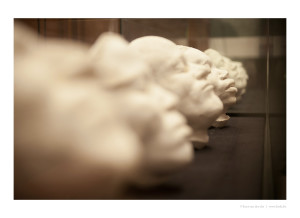Re-Moving Trauma

Since the 1990s, trauma studies have become a major topic of interest in the humanities and social sciences, as well as in theatre and performance practices. Trauma has become “the signal concept of our time” (Leys 2000: 10); trauma relief “a dominant mode of practice and discourse” (Thompson 2009: 44). Recent debates, however, point out that current dominant trauma theories and mental health care programs are bound by a Western memory regime that seems restrictive in several respects (Summerfield 2005, Stalpaert 2008, Watters 2010, and Craps 2013).
A first void in trauma studies is that it mainly examines the ‘eventfulness’ of trauma and does not deal with the effects of continuous and quotidian violence inflicted on humans. As a result, non-eventful forms of trauma such as sexism, racism, political oppression, colonialism and the daily fear of persecution have been largely neglected in trauma studies. However, as research has indicated, many recurring catastrophic events may be equally traumatizing (Root 1992, Rothberg 2009, Summerfield 2005). This conference considers non-eventful forms of trauma, such as apartheid and racism, as an important object in trauma studies.
Second, the Western memory regime of trauma treatment holds the firm belief that ‘telling one’s story’ is the preferred method that leads to ‘relief’, ‘liberation’ and ‘healing’. As a result of the dominance of the meaning-based and positivist trauma regime, the realities of suffering “are often prevented from being given their embodied character (Thompson 2009: 128-129). According to this approach, “constructing a narrative from the pain of the past allows it to be contained or healed” (Thompson 2009: 45). The imperative to cure through narrative recall and storytelling is embedded in the positivistic model of clinical practice, with healing as its ultimate goal (Summerfield 2005, Stalpaert 2008). As a result, mental health care practitioners mainly work in the realm of effect, neglecting the “affective register” (Thompson 2009: 7).
Third, the belief that the human capacity of recognition, description and understanding is an important tool in mastering the traumatic past in order to move on with a life in the present is grounded in a modernist historical regime. In contrast with modernity’s linear conceptualization of time and its belief that the past lies behind us, we adopt Jacques Derrida’s spectral notion of time in the work of mourning. With his notion of the ‘spectral past’, Derrida deconstructed the archeo-teleological concept of history and the linear and chronological alignment of narration with time and space. He pointed at “the persistence of a present past or the return of the dead which the worldwide work of mourning cannot get rid of” (Derrida 1994: 101; see also Bevernage 2012b).
The title of the conference, Re-Moving Apartheid, touches upon these issues. The use of re-moving entails an ironic comment on the discourse of ‘relief’, ‘liberation’ and ‘healing’ in the dominant Western trauma regime. A cultural trauma is not easily removed. The suffix re- in the title rather refers to the endless re-living of the traumatic experience. It indicates how a cultural trauma keeps on moving a person in a way that outwits common sense. The re-lived moments of traumatic shock actually point at “the limits faced by knowledge and representation” (Greene 1999: 33). The notion of re-moving hence indicates that there is no time after the cultural trauma of apartheid. As historian Berber Bevernage put it: the notion of a “persisting ‘past’… blurs the strict delineation between past and present and thereby even questions the existence of these temporal dimensions as separate entities” (2012a: 5). On yet another level, re-moving apartheid also refers to the ways in which (postdramatic and postnarrative) performances have the potential to move the spectator also – in a Nietzschean sense of the word – beyond common sense. For the spectator to be moved in this sense implies thinking “as an act of extreme emotional intensity” (Safranski 2000: 179-180). It implies dealing with the complexity of the cultural trauma of apartheid and racism, without “overlooking it or looking away” (Le Roy, Stalpaert, Verdoodt 2010: 263).
In that sense, it is our belief that art also has an important transformative role. It plays a significant role in creating non-verbal and embodied transformative encounters in violated and traumatized communities and it can provide a critical perspective on the restrictive Western memory regime at work in several practices of healing and reconciliation.
Works Cited
- Bevernage, Berber. History, Memory and State-Sponsored Violence. New York: Routledge, 2012.
- Craps, Stef. Postcolonial Witnessing: Trauma out of Bounds. Houndmills: Palgrave Macmillan, 2013.
- Derrida, Jacques. Specters of Marx: The State of the Debt, the Work of Mourning, and the New International. New York: Routledge, 1994.
- Greene, Naomi. Landscapes of Loss: The National Past in Postwar French Cinema, Princeton NJ: Princeton University Press, 1999.
- Le Roy, Frederik, Christel Stalpaert en Sofie Verdoodt (eds.). “Performing Cultural Trauma in Theatre and Film”, Arcadia. International Journal of Literary Studies 45(2010): 249-264.
- Leys, Ruth. Trauma. A Genealogy. Chicago University Press, 2000.
- Root, Maria (ed.). The Multiracial Experience. Racial Borders as the New Frontier. Thousand Oakes California: Sage Publications, 1996.
- Rothberg, Michael. Multidirectional Memory. Remembering the Holocaust in the Age of Decolonization. Stanford University Press, 2009.
- Safranski, Rüdiger. Nietzsche. Biografie seines Denkens. München: Carl Hanser Verlag, 2000.
- Stalpaert, Christel. “The Mind Taken Hostage: Antigone’s Corporeal Memory in Mind the Gap (2001)”, Mosaic. A Journal for the Interdisciplinary Study of Literature 41: 3(2008): 137-152.
- Summerfield, Derek. “‘My Whole Body is Sick… My Life is Not Good’. A Rwandan Asylum Seeker Attends a Psychiatric Clinic in London”. Forced Migration and Mental Health. Rethinking the Care of Refugees and Displaced Persons. Eds. David Ingleby. New York: Springer, 2005. 97-114.
- Thompson, James. Performance Affects. Applied Theatre and the End of Effect. Basingstoke: Palgrave Macmillan, 2009.
- Watters, Ethan. Crazy Like Us: The Globalization of the American Psyche. New York: Free Press, 2010.
